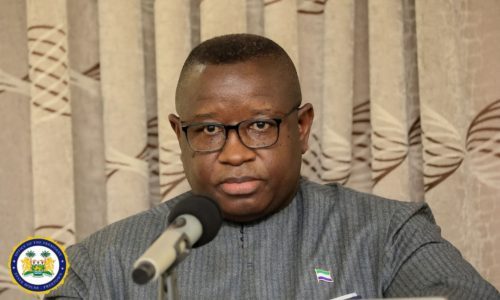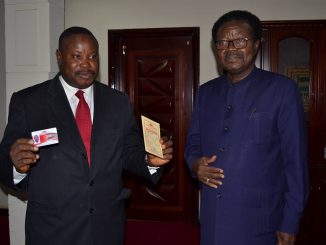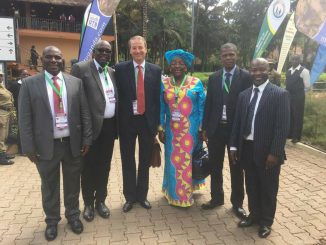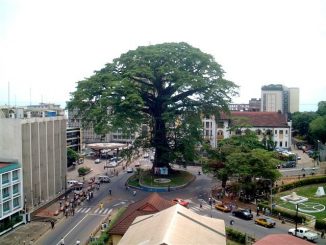
By Chernoh Alpha M. Bah, Matthew Anderson, and Mark Feldman
President Julius Maada Bio has appeared on a number of television and radio talk shows in Freetown over the last two days to talk about his Presidency. The media events are apparently organized to help him respond to the ongoing Africanist Press investigative reports on financial crimes in Sierra Leone. Africanist Press has uncovered largescale government corruption involving the President, his wife, and senior members of his administration.
In an effort to dismiss the glaring evidence of illegal public spending and the frivolous use of public money on international travel and other non-budgetary purposes, the President has made some statements that we found to be false and deliberately inaccurate. For instance, the President claimed he was prevented from checking into a hotel in Japan because his predecessor had a previous debt. He claimed he was forced to pay off the debt on arrival before he was allowed into the hotel. This false statement regarding a hotel debt in Japan has been repeated three times now by the President in his effort to justify the unprecedented expenditure his many international travels have cost the people of Sierra Leone.

Africanist Press has examined records of the President’s travel to verify this particular claim. The records show that President Bio made a trip to Japan in late August 2019. The President’s trip to Japan was for the Tokyo International Conference on African Development (TICAD) held on August 28-30, 2019, at Pacifico Yokohama, in Yokohama, Japan. The conference was co-hosted by the Japanese government, the United Nations, and other development agencies, including the World Bank. The government of Japan has lead this conference since 1993. The TICAD conference of 2019 had more than 10,000 people in attendance, including 42 African leaders from 53 African countries, and 108 heads of international and regional organizations.
Our investigation shows that all invited delegates to the TICAD conferences, in particular heads of state, had accommodation and relevant protocol arranged for by the host government in advance of their arrival. We investigated details of President Bio’s travel to the TICAD Conference in Yokohama, Japan, in 2019, and we found no evidence that President Bio, or any member of the Sierra Leone delegation, encountered any difficulty in accessing their hotel rooms on arrival in Japan during their visit for the TICAD conference.
A press release issued by the Japanese Foreign Ministry on 29 August 2019 confirmed that a 15 minutes summit meeting was held between President Bio and Japanese Prime Minister Shinzo Abe in Yokohama ahead of the conference. The press release confirmed that President Bio was visiting Japan to participate in the Seventh Tokyo International Conference on African Development (TICAD 7) held from August 28 to 30. Records from the Japanese Foreign Affairs Ministry reviewed by Africanist Press show clearly that strong diplomatic relations exist between Japan and Sierra Leone spanning three decades. Our investigation discovered that Japan first hosted an official delegation from Sierra Leone in October 1990 headed by then minister of agriculture and natural resources, Mohamed O. Bash-Taqi. Japan’s Foreign Ministry noted that a total of 12 diplomatic visits from Sierra Leone to Japan between 1990 and 2019. They included two presidential visits, first by Ernest Koroma in 2008 and 2013, and then by Julius Maada Bio in August 2019. Both presidents were invited to attend the TICAD conference.

Japanese diplomatic records further show that Alie Kabba, Maada Bio’s former minister of foreign affairs, also visited Japan for a TICAD Ministerial Meeting in October 2018, following in the trail of other foreign ministers who had visited Japan for similar meetings. In addition, we also discovered that current speaker of parliament, Abass Bundu also visited Japan in 2019 on an official invitation to witness the ceremony of the Enthronement of His Majesty the Emperor of Japan. An invitation for a similar event was extended to Sierra Leone’s foreign minister, Dr. Abdul Karim Koroma in November 1990.
Thus, contrary to Bio’s claim we found no evidence that relations between Japan and Sierra Leone suffered any constraints. Our investigation found that diplomatic relations between Sierra Leone and Japan has remained consistent since October 1990. We also investigated records on the President Bio’s travel expenditures during the Japan trip. The Bank of Sierra Leone (BSL) records on withdrawals and fund transfers show that President Bio withdrew a total of Le2,506,452,062.80 (about US$270,000) from the Bank of Sierra Leone (BSL) ahead of his Japan trip. We identified 6 transactions from the Local and Overseas Travel Account in August 2019, specifically associated with the 2019 Japan trip. They included 3 cash withdrawal transactions made on 23 August 2019, and 3 other transactions carried out between 26 and 29 August 2019, including a fund transfer to a travel agency. Two of these first three transactions were drawn in foreign currencies as per diem for both the President and his wife, the First Lady. They were in separate amounts of US$36,587 for the First Lady and US$91,601 for the President; a total of US$128,188 in per diems by the President and his wife for the 5-day trip to Japan.
These per diems do not include airfare, sea transport, or for supposed hotel accommodation costs paid in advance of the Japan trip. For instance, a fund transfer [FT1923830792] in the amount of Le1,234,251,149.00 (about US$124,000) was made on 26 August 2019, to Africa Travel Centre as payment of costs associated with the President’s travel to Yokohama and accommodation in Japan ahead of his departure. The other transactions include multiple foreign currency withdrawals in separate amounts of US$4,063 for Jariatu Darboe, US$3,762 for Tony Lloyd, and US$4,364 for Joseph A.T. Demby; all delegates accompanying the President and First Lady to the Japan conference. Thus, we discovered both from the conference records and the President’s travel records that logistics and protocol arrangements, including hotel bookings, were already confirmed before the president’s arrival in Yokohama, Japan. There is no evidence that President Bio encountered any delay or difficulty in accessing his hotel or anything else related to his visit on arrival in Japan.

In fact, our investigation found no evidence that additional payments were made by the President towards hotel accommodation while in Japan. Besides the fund transfer payment made to Africa Travel Centre ahead of the President’s trip, we found no evidence on record in Yokohama and at the BSL in Freetown that any additional wire transfer payment was made towards additional hotel charges in Japan on behalf of the President. Further, our examination of the President’s Travel Expenditure Account shows no evidence of retirement or return of unused per diem by the President, and the First Lady, or any member of his delegation to Japan despite the significant withdrawal and transfer of foreign currencies (over US$120,000) in cash ahead of the 5-day trip to Japan. President Bio was elected on a promise to enforce fiscal discipline, and reduce waste and graft in public spending, including reductions in foreign travel by public officials. “My government will develop and introduce a standardized overseas travel policy for the public service and covering all categories of workers, including government ministers as part of additional expenditure control measures,” President Bio announced in Parliament on May 10, 2018, during his state opening address. An internal memo dated August 1, 2019, from the Office of the President addressed to all heads of government ministries, agencies, and departments announced a temporary freeze on overseas travel by public officials.
“The President has directed that with immediate effect all ministers, ministers of state, deputy ministers and all other public servants should not embark on official overseas trips, except for statutory engagements, until further notice. Participation at statutory meetings must be cleared with His Excellency the President on the submission of concurrence for the use of public funds,” wrote Secretary to the President Julius Sandy on August 1, 2019. However, despite these public pronouncements and promises, President Bio and his wife spent much of the first two years in office making frequent trips to Europe and Asia, drawing public criticism on the purposes and significance of these travels. Critics of the President say the number of overseas travels is now over 70 international trips in two years, a record that exceeds any sitting president of Sierra Leone since the end of the country’s civil war in 2002.

Bio, on the other hand, has argued that he travels frequently to rebrand the image of the country. “We are traveling internationally to reassure investors and multilateral partners that Sierra Leone as a country is well prepared now than ever to effectively manage resources that come in as assistance to the country, and that we are no longer a country of war and Ebola,” Bio recently told a Sierra Leonean audience in Accra during a visit to Ghana early this year. Towards the end of 2019, however, Jacob Jusu Saffa – Bio’s finance minister – proposed a new legislative provision to grant President Bio unregulated access to travel money. The Finance Ministry’s Finance Amendment Act of 2020 called for an amendment to Section 65 of the 2016 Public Financial Management Act, which is the law that regulates government travel expenditure. The amendment substituted the law with a new provision that would have allowed Bio unregulated access to travel money. Section 42 of the proposed 2020 Finance Act requested Parliament to approve the new legislative provision for non-accountable use of travel funds by the President and his deputy for all international travels. The proposed law specifically provides in Section 42(5) for “non-accountable imprest to be provided for daily international travel expenses, excluding purchase of tickets incurred by the President and Vice President.”
Parliament initially passed the proposed legislation into law in late November 2019, but in early December 2019, Parliamentarians voted again to remove the legislation from the 2020 Finance Act due to public pressure. The law had given the President, and two of his top officials – the Vice President and Speaker of Parliament – open cheques to use public funds when on overseas travel. An Africanist Press investigation into the financial operations of the Bio administration since May 2018 uncovered evidence revealing the use of local and international travel by senior government officials, including the President, to move foreign currencies amounting to billions of Leones (millions of US$) out of Sierra Leone to foreign destinations under the guise of per diems and imprest. We discovered that by the time Finance Minister Jacob Saffa proposed the legislation on unregulated imprest in late 2019, senior government officials who travelled on overseas trips, including the President, the First Lady (a non-government position), the Chief Minister, and the Director of Science and Innovation, had already spent billions of Leones. Documents reviewed by the Africanist Press, for example, show that a total of Le3,330,412,548 (about US$330,000) was spent on travel per diems between August and December 2018 alone, in the first four months after the appointment of David Francis as Chief Minister. We discovered that when senior administration officials travel, large cash withdrawals and wire transfers have been regular and frequent.
We attach here document showing list of diplomatic visits between Sierra Leone and Japan since 1990.



